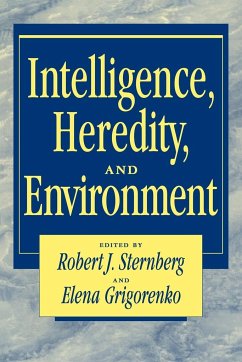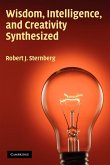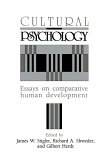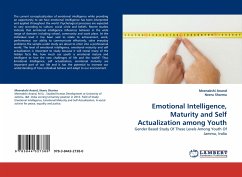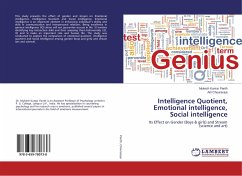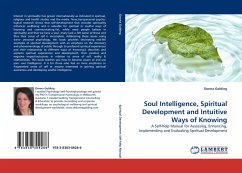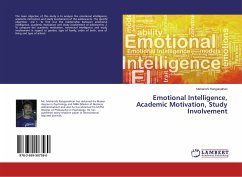J. Sternberg / Elena Grigorenko (eds.)
Intelligence, Heredity and Environment
Herausgeber: Sternberg, Robert J.; Grigorenko, Elena
J. Sternberg / Elena Grigorenko (eds.)
Intelligence, Heredity and Environment
Herausgeber: Sternberg, Robert J.; Grigorenko, Elena
- Broschiertes Buch
- Merkliste
- Auf die Merkliste
- Bewerten Bewerten
- Teilen
- Produkt teilen
- Produkterinnerung
- Produkterinnerung
This book provides a comprehensive, balanced, up-to-date survey of theory and research on the origins and transmission of human intelligence. The book is unique in the diversity of viewpoints it presents, as well as in its inclusion of the most recent theories and findings.Intelligence, Heredity, and Environment is for everyone who is interested in the question of how intelligence is transmitted. Although the chapters are technically sound and rigorous, they can be understood by readers outside the field. Students, faculty, educational researchers, and geneticists interested in intelligence will find this indispensable reading.…mehr
Andere Kunden interessierten sich auch für
![Wisdom, Intelligence, and Creativity Synthesized Wisdom, Intelligence, and Creativity Synthesized]() Robert J. SternbergWisdom, Intelligence, and Creativity Synthesized36,99 €
Robert J. SternbergWisdom, Intelligence, and Creativity Synthesized36,99 €![Cultural Psychology Cultural Psychology]() W. Stigler / A. Schweder / S. Herdt (eds.)Cultural Psychology92,99 €
W. Stigler / A. Schweder / S. Herdt (eds.)Cultural Psychology92,99 €![Emotional Intelligence, Adjustment and Academic Performance Emotional Intelligence, Adjustment and Academic Performance]() Karunya.A. DonthiEmotional Intelligence, Adjustment and Academic Performance32,99 €
Karunya.A. DonthiEmotional Intelligence, Adjustment and Academic Performance32,99 €![Emotional Intelligence, Maturity and Self Actualization among Youth Emotional Intelligence, Maturity and Self Actualization among Youth]() Meenakshi AnandEmotional Intelligence, Maturity and Self Actualization among Youth32,99 €
Meenakshi AnandEmotional Intelligence, Maturity and Self Actualization among Youth32,99 €![Intelligence Quotient, Emotional intelligence, Social intelligence Intelligence Quotient, Emotional intelligence, Social intelligence]() Mukesh Kumar PanthIntelligence Quotient, Emotional intelligence, Social intelligence36,99 €
Mukesh Kumar PanthIntelligence Quotient, Emotional intelligence, Social intelligence36,99 €![Soul Intelligence, Spiritual Development and Intuitive Ways of Knowing Soul Intelligence, Spiritual Development and Intuitive Ways of Knowing]() Donna GoldingSoul Intelligence, Spiritual Development and Intuitive Ways of Knowing44,99 €
Donna GoldingSoul Intelligence, Spiritual Development and Intuitive Ways of Knowing44,99 €![Emotional Intelligence, Academic Motivation, Study Involvement Emotional Intelligence, Academic Motivation, Study Involvement]() Maharishi RanganathanEmotional Intelligence, Academic Motivation, Study Involvement26,99 €
Maharishi RanganathanEmotional Intelligence, Academic Motivation, Study Involvement26,99 €-
-
-
This book provides a comprehensive, balanced, up-to-date survey of theory and research on the origins and transmission of human intelligence. The book is unique in the diversity of viewpoints it presents, as well as in its inclusion of the most recent theories and findings.Intelligence, Heredity, and Environment is for everyone who is interested in the question of how intelligence is transmitted. Although the chapters are technically sound and rigorous, they can be understood by readers outside the field. Students, faculty, educational researchers, and geneticists interested in intelligence will find this indispensable reading.
Produktdetails
- Produktdetails
- Verlag: Cambridge University Press
- Seitenzahl: 632
- Erscheinungstermin: 28. Februar 2009
- Englisch
- Abmessung: 229mm x 152mm x 37mm
- Gewicht: 1011g
- ISBN-13: 9780521469043
- ISBN-10: 052146904X
- Artikelnr.: 21725380
- Herstellerkennzeichnung
- Libri GmbH
- Europaallee 1
- 36244 Bad Hersfeld
- gpsr@libri.de
- Verlag: Cambridge University Press
- Seitenzahl: 632
- Erscheinungstermin: 28. Februar 2009
- Englisch
- Abmessung: 229mm x 152mm x 37mm
- Gewicht: 1011g
- ISBN-13: 9780521469043
- ISBN-10: 052146904X
- Artikelnr.: 21725380
- Herstellerkennzeichnung
- Libri GmbH
- Europaallee 1
- 36244 Bad Hersfeld
- gpsr@libri.de
Part I. The Nature-Nurture Question: New Advances in Behavior-Genetic
Research on Intelligence: 1. Behavior genetics and socialization theories
of intelligence: truce and reconciliation S. Scarr; 2. The puzzle of
nongenetic variance A. R. Jensen; 3. Identifying genes for cognitive
abilities and disabilities R. Plomin; 4. Heredity, environment, and IQ in
the Texas Adoption Project J. C. Loehlin et al.; 5. IQ similarity in twins
reared apart: findings and responses to critics T. J. Bouchard; Part II.
Novel Theoretical Perspectives on the Genes and Culture Controversy: 6. The
invalid separation of effects of nature and nurture: lessons from animal
experimentation D. Wahlsten and G. Gottlieb; 7. Between nature and nurture:
the role of human agency in the epigenesis of intelligence T. R. Bidell and
K. W. Fischer; 8. A third perspective: the symbol systems approach H.
Gardner and T. Hatch; 9. A cultural psychology perspective on intelligence
J. G. Miller; 10. A bio-ecological model of intellectual development:
moving beyond h2 S. J. Ceci et al.; 11. An interactionist perspective on
the genesis of intelligence E. W. Gordon and M. P. Lemons; Part III.
Specific Issues in the Nature-Nurture Controversy: 12. Educating
intelligence: infusing the Triarchic theory into school instruction R. J.
Sternberg; 13. Raising IQ level by vitamin and mineral supplementation H.
J. Eysenck and S. J. Schoenthaler; 14. The resolution of the nature-nurture
controversy by Russian psychology: culturally biased or culturally
Specific? E. L. Grigorenko and T. V. Korilova; 15. The emerging horizontal
dimension of practical intelligence: polycontextuality and boundary
crossing in complex work activities Y. Engestrom et al.; 16. Cognitive
development from infancy to middle childhood Stacey S. Cherney et al.; 17.
Intelligence, language, nature, and nurture in young twins J. S. Reznick;
18. Sources of individual differences in infant social cognition: cognitive
and affective aspects of self and other S. Pipp et al.; Part IV.
Integration and Conclusions: 19. Conclusions E. Hunt; 20. Unresolved
questions and future directions in behavior genetics studies of
intelligence I. Waldman.
Research on Intelligence: 1. Behavior genetics and socialization theories
of intelligence: truce and reconciliation S. Scarr; 2. The puzzle of
nongenetic variance A. R. Jensen; 3. Identifying genes for cognitive
abilities and disabilities R. Plomin; 4. Heredity, environment, and IQ in
the Texas Adoption Project J. C. Loehlin et al.; 5. IQ similarity in twins
reared apart: findings and responses to critics T. J. Bouchard; Part II.
Novel Theoretical Perspectives on the Genes and Culture Controversy: 6. The
invalid separation of effects of nature and nurture: lessons from animal
experimentation D. Wahlsten and G. Gottlieb; 7. Between nature and nurture:
the role of human agency in the epigenesis of intelligence T. R. Bidell and
K. W. Fischer; 8. A third perspective: the symbol systems approach H.
Gardner and T. Hatch; 9. A cultural psychology perspective on intelligence
J. G. Miller; 10. A bio-ecological model of intellectual development:
moving beyond h2 S. J. Ceci et al.; 11. An interactionist perspective on
the genesis of intelligence E. W. Gordon and M. P. Lemons; Part III.
Specific Issues in the Nature-Nurture Controversy: 12. Educating
intelligence: infusing the Triarchic theory into school instruction R. J.
Sternberg; 13. Raising IQ level by vitamin and mineral supplementation H.
J. Eysenck and S. J. Schoenthaler; 14. The resolution of the nature-nurture
controversy by Russian psychology: culturally biased or culturally
Specific? E. L. Grigorenko and T. V. Korilova; 15. The emerging horizontal
dimension of practical intelligence: polycontextuality and boundary
crossing in complex work activities Y. Engestrom et al.; 16. Cognitive
development from infancy to middle childhood Stacey S. Cherney et al.; 17.
Intelligence, language, nature, and nurture in young twins J. S. Reznick;
18. Sources of individual differences in infant social cognition: cognitive
and affective aspects of self and other S. Pipp et al.; Part IV.
Integration and Conclusions: 19. Conclusions E. Hunt; 20. Unresolved
questions and future directions in behavior genetics studies of
intelligence I. Waldman.
Part I. The Nature-Nurture Question: New Advances in Behavior-Genetic
Research on Intelligence: 1. Behavior genetics and socialization theories
of intelligence: truce and reconciliation S. Scarr; 2. The puzzle of
nongenetic variance A. R. Jensen; 3. Identifying genes for cognitive
abilities and disabilities R. Plomin; 4. Heredity, environment, and IQ in
the Texas Adoption Project J. C. Loehlin et al.; 5. IQ similarity in twins
reared apart: findings and responses to critics T. J. Bouchard; Part II.
Novel Theoretical Perspectives on the Genes and Culture Controversy: 6. The
invalid separation of effects of nature and nurture: lessons from animal
experimentation D. Wahlsten and G. Gottlieb; 7. Between nature and nurture:
the role of human agency in the epigenesis of intelligence T. R. Bidell and
K. W. Fischer; 8. A third perspective: the symbol systems approach H.
Gardner and T. Hatch; 9. A cultural psychology perspective on intelligence
J. G. Miller; 10. A bio-ecological model of intellectual development:
moving beyond h2 S. J. Ceci et al.; 11. An interactionist perspective on
the genesis of intelligence E. W. Gordon and M. P. Lemons; Part III.
Specific Issues in the Nature-Nurture Controversy: 12. Educating
intelligence: infusing the Triarchic theory into school instruction R. J.
Sternberg; 13. Raising IQ level by vitamin and mineral supplementation H.
J. Eysenck and S. J. Schoenthaler; 14. The resolution of the nature-nurture
controversy by Russian psychology: culturally biased or culturally
Specific? E. L. Grigorenko and T. V. Korilova; 15. The emerging horizontal
dimension of practical intelligence: polycontextuality and boundary
crossing in complex work activities Y. Engestrom et al.; 16. Cognitive
development from infancy to middle childhood Stacey S. Cherney et al.; 17.
Intelligence, language, nature, and nurture in young twins J. S. Reznick;
18. Sources of individual differences in infant social cognition: cognitive
and affective aspects of self and other S. Pipp et al.; Part IV.
Integration and Conclusions: 19. Conclusions E. Hunt; 20. Unresolved
questions and future directions in behavior genetics studies of
intelligence I. Waldman.
Research on Intelligence: 1. Behavior genetics and socialization theories
of intelligence: truce and reconciliation S. Scarr; 2. The puzzle of
nongenetic variance A. R. Jensen; 3. Identifying genes for cognitive
abilities and disabilities R. Plomin; 4. Heredity, environment, and IQ in
the Texas Adoption Project J. C. Loehlin et al.; 5. IQ similarity in twins
reared apart: findings and responses to critics T. J. Bouchard; Part II.
Novel Theoretical Perspectives on the Genes and Culture Controversy: 6. The
invalid separation of effects of nature and nurture: lessons from animal
experimentation D. Wahlsten and G. Gottlieb; 7. Between nature and nurture:
the role of human agency in the epigenesis of intelligence T. R. Bidell and
K. W. Fischer; 8. A third perspective: the symbol systems approach H.
Gardner and T. Hatch; 9. A cultural psychology perspective on intelligence
J. G. Miller; 10. A bio-ecological model of intellectual development:
moving beyond h2 S. J. Ceci et al.; 11. An interactionist perspective on
the genesis of intelligence E. W. Gordon and M. P. Lemons; Part III.
Specific Issues in the Nature-Nurture Controversy: 12. Educating
intelligence: infusing the Triarchic theory into school instruction R. J.
Sternberg; 13. Raising IQ level by vitamin and mineral supplementation H.
J. Eysenck and S. J. Schoenthaler; 14. The resolution of the nature-nurture
controversy by Russian psychology: culturally biased or culturally
Specific? E. L. Grigorenko and T. V. Korilova; 15. The emerging horizontal
dimension of practical intelligence: polycontextuality and boundary
crossing in complex work activities Y. Engestrom et al.; 16. Cognitive
development from infancy to middle childhood Stacey S. Cherney et al.; 17.
Intelligence, language, nature, and nurture in young twins J. S. Reznick;
18. Sources of individual differences in infant social cognition: cognitive
and affective aspects of self and other S. Pipp et al.; Part IV.
Integration and Conclusions: 19. Conclusions E. Hunt; 20. Unresolved
questions and future directions in behavior genetics studies of
intelligence I. Waldman.

